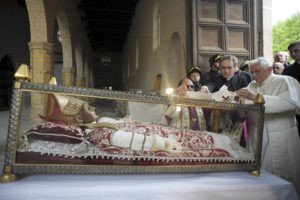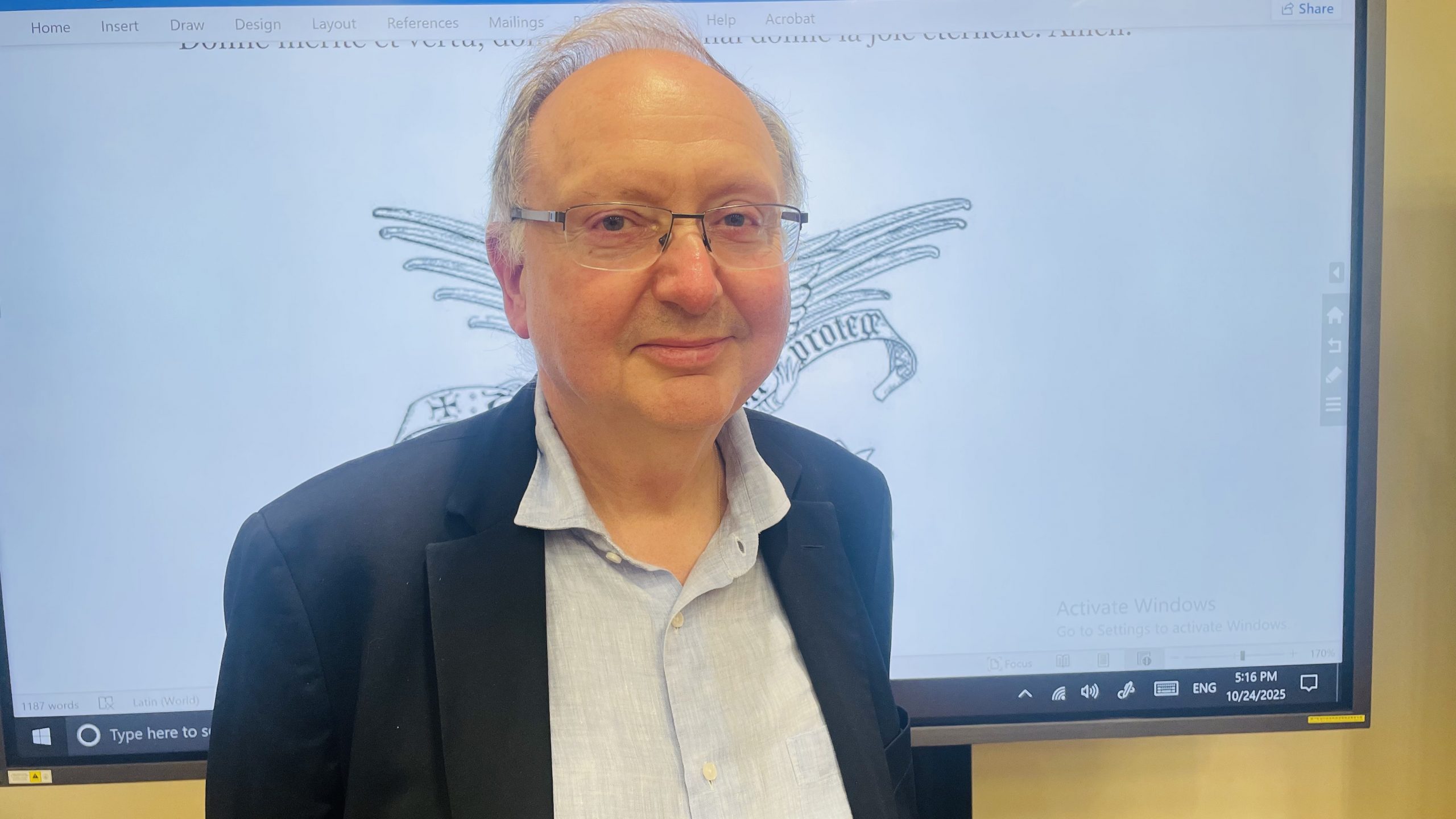Pope Benedict XVI visits the relics of Pope St Celestine V in the 13th-century Santa Maria di Collemaggio Basilica, in L’Aquila, Italy, in 2009. (Photo: AP/L’Osservatore Romano)
– Aurelio Porfiri
Saint Celestine V (Pietro Angeleri or Pietro di Morrone – 1215-1296), passed into history as the Pope who resigned from the Pontificate in 1294. The Church celebrates his feast day on May 19. He came from a modest family of peasants and from his youth, felt attracted by the eremitical life, a life spent in penance.
Many flocked to him, recognizing his holiness of life. Peter created a congregation called the Hermits of San Damiano or Celestini. He attracted many monks for his congregation, who intended to live their monastic vocation in the austere way proposed by Peter. Having said this, it seems quite strange that at the death of the pontiff the cardinals went looking for someone like him, hidden from the world. This was precisely what happened: “On the death of Nicholas IV (1292) the Holy See was vacant for twenty-seven months because the eleven voters were divided between the two parties of the Colonna and the Orsini, and King Charles II of Naples (+1309), son and successor of Charles of Anjou, brother of St Louis IX, king of France, he brigated for the choice of a cardinal of his liking. The election of Pietro da Morrone, whose story seems to be a legend, is the strangest that is remembered. In the spring of 1294 the king of Naples had gone to Perugia and had discussed with the cardinals gathered in conclave. From there he passed to Sulmona where he granted privileges to the followers of Morrone who, shortly afterwards, wrote a letter to Cardinal Latino in which he threatened terrible punishments by God if, within four months, the sacred College had not elected the Pope. Everyone had heard of the hermit as a miracle worker, but nobody knew him by sight. Convinced that he was the best person to govern the Church, on the proposal of Cardinal Latino they gave him the vote. A commission of prelates and notaries was sent to the Maiella mountains to ask Morrone if he wanted to accept. The legates found in a cavern an old man of over eighty, pale, emaciated by fasting, dressed in rough cloth and wearing donkey skins. They told him of his election to the papacy, but he accepted it only because he was pressed by the confreres. The news of the extraordinary event came to the court of Charles II, who rushed to Sulmona in order to make the elected docile instrument of his interests. Contrary to the opinion of the cardinals, who invited him to Perugia to remove him from the influences of the Angioino, he decided to stay a while in L’Aquila where, following the example of Christ, he wanted to sit on a donkey, escorted by Charles II and his son, who supported the bridles” (Guido Pettinati, santiebeati.it).
Of course, it seems like a legendary story, but it could indeed have happened this way. The person you least expect, whose physical appearance they did not even know, was chosen as Pontiff. But in fact something that was not right was there, since Celestine, despite his personal sanctity and integrity, was perhaps not ready for a demanding role like that of a Pontiff, not being knowledgeable not only of Latin language, but also of administrative and canonical notions. It also appears that he greatly favored his religious congregation. In short, it was realized that Celestine was not able to fulfill his role. He himself realized this, because he was a good man of great faith: “Struck by the disorder that infiltrated the Church because of his administrative incapacity, Celestine V realized that he was not up to his task, which is why he felt himself moaning, in the grip of remorse: ‘My God, while reigning over souls, here I lose mine.’ He then consulted canon law experts, including Benedetto Gaetani, and all replied that the pope could abdicate for sufficient reasons. As soon as the Neapolitans got the feeling that a pope so good and so easy to be deceived was about to abandon them, they invaded the New Castle. Celestine V barely managed to calm them down with vague promises and the authorization to make prayers and processions to ask God for more light. After preparing the act of renunciation of pontifical power with Gaetani and a constitution that recognized the pontiff as having the right to resign, on the day of St Lucia he summoned the consistory, ordered those present not to interrupt him, then with a loud and firm voice he read his free and spontaneous renunciation of the power of the keys ‘because of humility, perfect life and preservation of conscience, due to weakness of health and defect of science, to recover the peace and the consolation of ancient living.’ Among the tears of the onlookers he laid down the papal insignia to put on his old habit. Well wrote E. Casti on the occasion of the 6th centenary of the coronation of Celestine V: ‘The abdication was neither a cowardice nor an act of heroism; it was the simple fulfillment of the strict duty that is incumbent on anyone who has assumed an office disproportionate to his own strength. The moral duty to remain in his place could not oblige because it was in contrast with the most imperious interest of the common good.’ On December 24, Cardinal Gaetani was elected Pope with the name of Boniface VIII. One of his first acts was to annul all the favors granted by his predecessor who longed to return to his hermitage, while the Pope wanted him to follow him to Campania to prevent any schisms or rebellions” (Guido Pettinati, santiebeati.it).
Cardinal Gaetani (or Caetani) was of a completely different temper and held the Church with an iron fist, for some even too much. The good Pietro di Morrone escaped from the attentions of those who wanted to keep him under control and returned to his hermitage to die singing psalms in 1296.
What is the lesson that we can deduce from the very short Papacy of Celestine V? That personal holiness is not necessarily part of the essential characteristics to be a good Pontiff. If a Pope is also a saint it is certainly better, but there are characteristics that are probably more important still, such as the ability to command, the profound knowledge of doctrine and Tradition, the capacity for mediation between the different souls of the one Church without being too partisan of one or the other (but always safeguarding the doctrine). There was a lot of talk about Celestine V, of course, at the time of the resignation of Benedict XVI. There are similarities, there is no doubt. All those who have approached Cardinal Ratzinger have recognized his great simplicity and personal modesty, contrary to what a certain hostile narrative wanted to make us think about him. A man of great science and great faith, but probably, as he himself acknowledges, with a not-so-great aptitude for leadership. This led to an objective state of confusion in the Church. That said, was it a good step to resign, given that today the confusion and the division seems even bigger? It is very difficult to say, because we must recognize that although leadership was lacking, but his teaching was in many respects highly illuminating, against many drifts of the modern Church.


 Follow
Follow


